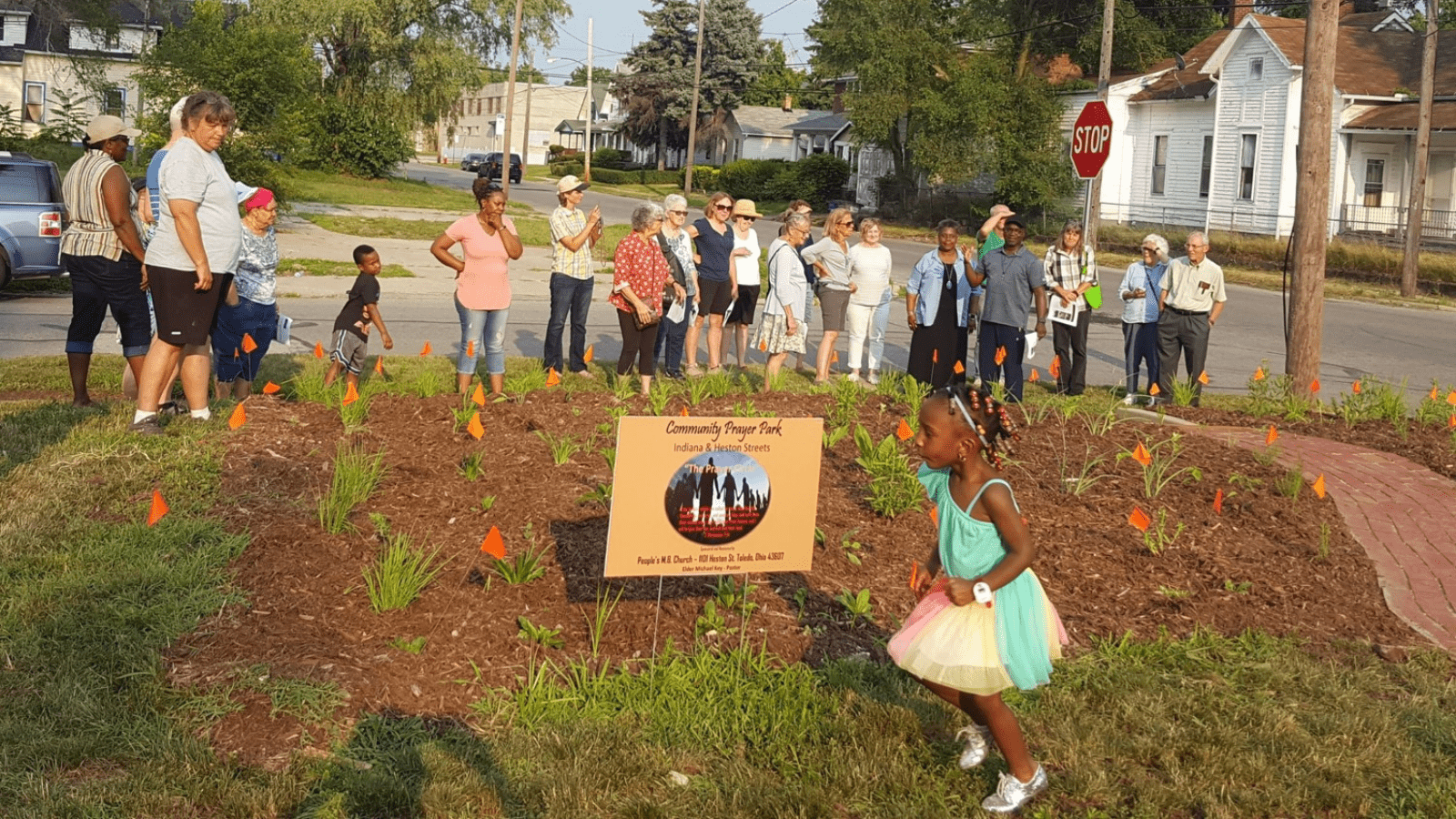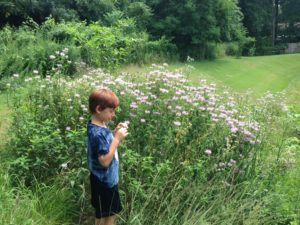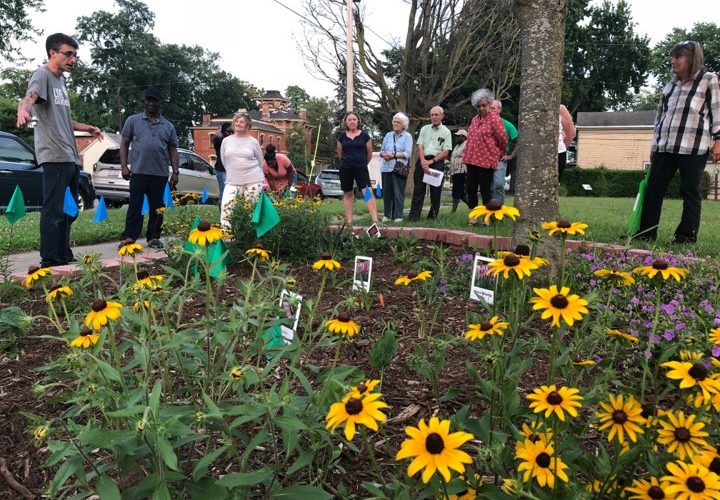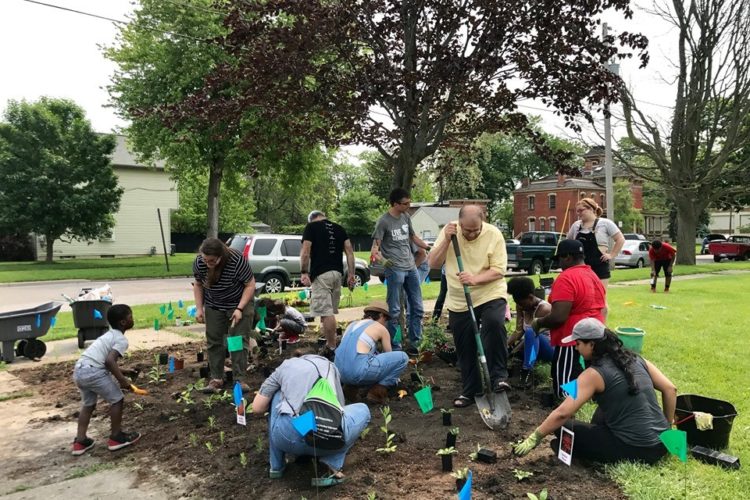We have much more to do and your continued support is needed now more than ever.
Faith, Flora, and Friendship
Sacred Grounds Helps Congregations Connect with Nature and Build Community in the Great Lakes Region

Houses of worship have always been about more than religious practice. They serve as vital community hubs where people celebrate life events, engage in recreational activities, and join together to support neighbors experiencing hardship. Through our Sacred Grounds project, the National Wildlife Federation is building on this tradition of faith in action by working with congregations to plan and install native plant habitats on the grounds of their church, synagogue, mosque, or other spiritual center. When communities are healthy, wildlife will flourish, too.
“Our prayer garden has really become that focal point of caring about what God has put in our hands,” said Pastor Michael Key of People’s Missionary Baptist Church in Toledo.
With technical and program assistance from National Wildlife Federation Great Lakes staff, 20 congregations in Toledo and a growing number in Grand Rapids and Detroit are creating beautiful spaces where both people and wildlife can thrive. And in the process, they’re linking their faith practice with environmental stewardship and building community connections beyond their own membership.
The participating houses of worship, representing diverse faiths and denominations, also have a unique opportunity to interact and work together through the Sacred Grounds Program. We believe that it is through these efforts, where people cross borders on faith and religion to achieve common goals and foster connections to the natural world, that both wildlife and people will thrive.
Putting Down Roots
Sacred Grounds builds on the Certified Wildlife Habitat program, through which nearly 800 places of worship have developed rain gardens, pollinator gardens, and outdoor spaces for meditation and education. Sacred Grounds takes the concept a step farther:
- Participating houses of worship create and sustain a Certified Wildlife Habitat on their site.
- Leaders integrate faith and environment conservation into their spiritual activities.
- Individual congregation members are engaged through group activities and encouraged to participate at home, including creating their own gardens.
- Congregations advocate for these practices in the broader community.

The idea for Sacred Grounds emerged about a decade ago when a National Wildlife Federation staff member Naomi Edelson started working with her synagogue and a few other area congregations to install native plant gardens and educate community members about the importance of sustaining wildlife habitats. This led to the creation of the Sacred Grounds program, whereafter she led workshops with other congregations in the Mid-Atlantic region over the next several years.
Four years ago, a diverse group in Toledo, Ohio—representing local government, nonprofits, and the private sector, including a native plant business, and even a cemetery—approached the National Wildlife Federation Great Lakes Regional Center for assistance.
They had come together to promote native plant gardens, and the Sacred Grounds program worked with them to develop materials and create a program to support houses of worship to carry out this work and become demonstration sites. By early 2018 the Sacred Grounds Toledo team—which includes the City of Toledo, the Toledo-Lucas County Sustainability Commission, Wild Ones Oak Openings Region, Woodlawn Cemetery, the Toledo-Lucas County Rain Garden Initiative, the Lucas Soil and Water Conservation District, and Poppin Up Natives—and the National Wildlife Federation were actively engaged, in planting partnership, with local houses of worship.
Greening Infrastructure
The benefits of creating native plant gardens are well documented. To name just a few, they:
- Help manage stormwater and improve water quality.
- Attract pollinators, like bees and butterflies.
- Provide opportunities for people living in urban areas to connect with nature and enjoy the health benefits of spending time in the great outdoors.

Participating in Sacred Grounds can lead to a few other perks, as well. Some local governments offer financial incentives for creating rain gardens and other runoff management strategies. Congregations can also save time and money by incorporating sustainable landscape maintenance and avoiding annual replanting. But the biggest draw is simply the opportunity to make connections between faith practice and environmental stewardship.
The National Wildlife Federation works to establish authentic partnerships in each city, recognizing that while all ground is sacred, each community has unique challenges and opportunities. In Detroit, for example, residents are faced with skyrocketing water bills, which are based in part on the amount of impervious surface coverage on their property. Rain gardens and other green infrastructure projects are a great way to address local flooding and reduce water bills.
In Detroit, faith based institutions, which often have significant areas of impervious surface, are facing new drainage fees that are assessed by the amount of impervious acreage. In order to lessen these significant increases in monthly bills, many houses of worship across the city are increasingly interested in green stormwater infrastructure (GSI) projects but often lack funds and resources to get started.
Knowing that houses of worship serve as vital community anchors for disseminating native habitats, rain gardens and other best management practices (BMPs), the NWF Great Lakes Sacred Grounds Program was awarded a grant in June 2020 through the National Fish and Wildlife Foundation Southeast Michigan Resilience Fund along to come alongside nine houses of worship to help build resources and capacity to create and maintain large and small scale GSI projects and rain gardens.
Through our partnership with Friends of the Rouge (FOTR) and Sierra Club of Michigan, organizations with long-term experience and commitment to community-led rain garden installations across the city, we are equipped to build upon the already existing network of native plant green infrastructure projects and continue developing connection within the faith community to ultimately improve the health of both wildlife and people.

In line with the National Wildlife Federation’s commitments to equity and justice, Sacred Grounds supports houses of worship that might not have the financial or technical resources to meet the unique needs of their community on their own. The project is continuing through the COVID-19 pandemic as people seek out ways to deal with social isolation through safe, outdoor activities. In Toledo, we’re working together with the Sacred Grounds Team to host virtual workshops open to the public, and the first 50 people to register, receive a voucher from a local nursery to buy enough plants to start their own 10′-by-10′ garden.
Healthy habitats and healthy communities go hand in hand—and Sacred Grounds is promoting both in the Great Lakes region and beyond.





















